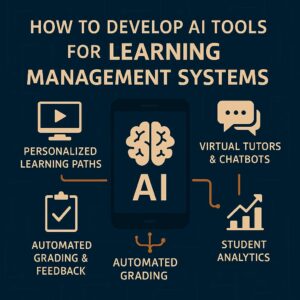Introduction
The education sector is undergoing a transformation, with AI-powered Learning Management Systems (LMS) enhancing how students learn and educators manage courses. AI-driven LMS tools streamline content delivery, personalized learning, automated assessments, and student engagement.
This guide provides a step-by-step approach to developing AI tools for LMS, structured using SEO-friendly formatting to optimize search rankings and enhance visibility.

1. Why AI Tools Are Essential for LMS
AI empowers LMS platforms by automating administrative tasks, improving student interaction, and enabling adaptive learning.
Key Benefits of AI in LMS
- Personalized Learning Paths – AI customizes coursework based on individual progress and preferences.
- Automated Grading & Feedback – Machine learning enables instant assessment and feedback for students.
- Advanced Student Analytics – AI analyzes engagement, performance, and knowledge gaps.
- Intelligent Content Recommendation – Suggests relevant learning materials based on student behavior.
- Virtual Tutors & Chatbots – AI-driven assistants provide instant academic support and guidance.
These capabilities ensure efficient learning environments tailored to student needs.
2. Core Technologies Behind AI LMS Tools
AI-powered LMS platforms integrate multiple technologies to optimize learning, automate tasks, and enhance engagement.
Fundamental AI Technologies in LMS Development
- Machine Learning – Analyzes student behavior and adapts coursework accordingly.
- Natural Language Processing (NLP) – AI chatbots offer tutoring support and content recommendations.
- Computer Vision – Detects facial expressions for engagement tracking and exam monitoring.
- Neural Networks – Processes large amounts of learning data to provide adaptive testing and assessments.
- Predictive Analytics – Identifies student challenges before they arise, offering proactive solutions.
By integrating these technologies, LMS platforms become more intelligent and effective for educators and students alike.
3. Designing AI Tools for LMS Optimization
Developing AI-powered LMS tools requires strategic planning and seamless integration.
Step-by-Step Development Process
- Define Learning Objectives – Identify target users, skill levels, and educational goals.
- Collect & Organize Learning Data – Gather structured content for AI training.
- Develop AI Algorithms – Implement ML models for personalized recommendations and automated assessments.
- Integrate NLP Chatbots – Enable real-time student support and intelligent tutoring.
- Enhance User Interface (UI) – Ensure a seamless, engaging, and interactive learning experience.
- Test & Optimize – Continuously refine AI tools based on student performance and feedback.
Each step contributes to efficient AI-powered learning management solutions.
4. SEO Optimization for AI LMS Platforms
SEO strategies help AI-driven LMS platforms reach a broader audience and improve engagement.
SEO Best Practices for LMS Development
- Keyword Optimization – Use phrases like “AI-powered LMS,” “smart learning platforms,” and “adaptive education technology.”
- Content Marketing – Publish blogs, tutorials, and case studies demonstrating AI’s impact on education.
- Mobile-Friendly LMS Design – Ensure seamless navigation for students using smartphones or tablets.
- Collaborations & Outreach – Partner with educators and institutions to enhance credibility.
- Structured Metadata – Optimize learning modules, descriptions, and tags for search rankings.
Strong SEO ensures AI LMS tools are discoverable and widely adopted.
5. Monitoring & Enhancing AI LMS Tools
Continuous monitoring and refinement improve AI learning experiences over time.
Metrics for AI LMS Optimization
- Student Engagement Analytics – Track interaction levels and learning completion rates.
- AI Accuracy in Recommendations – Assess how effectively AI suggests content based on student progress.
- Speed & Efficiency of AI Assessments – Ensure quick grading and feedback processes.
- User Satisfaction & Adoption Rates – Gather feedback to enhance user experience.
- Security & Privacy Compliance – Protect student data through strict encryption protocols.
By refining AI LMS tools, educators ensure long-term success and student-driven learning experiences.
Conclusion
AI-powered Learning Management Systems are reshaping education by automating processes, enhancing engagement, and delivering personalized learning paths. Organizations embracing AI-driven LMS technology can improve student outcomes and optimize teaching workflows.
